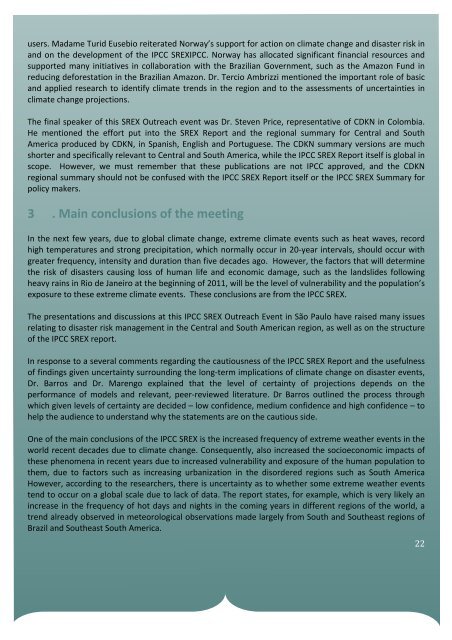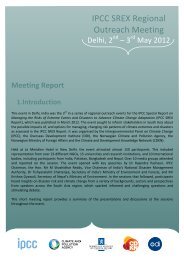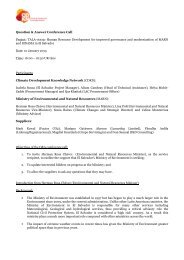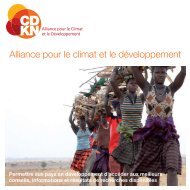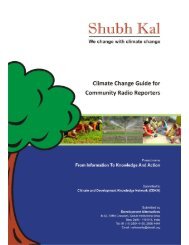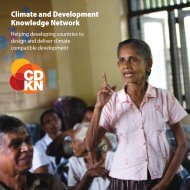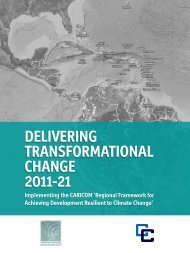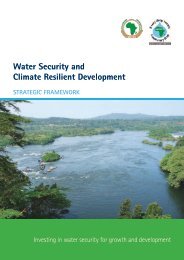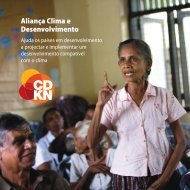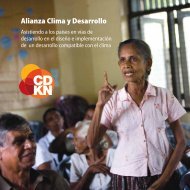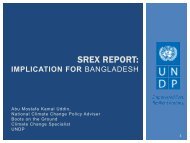Meeting Report - CDKN Global
Meeting Report - CDKN Global
Meeting Report - CDKN Global
- No tags were found...
Create successful ePaper yourself
Turn your PDF publications into a flip-book with our unique Google optimized e-Paper software.
users. Madame Turid Eusebio reiterated Norway’s support for action on climate change and disaster risk in and on the development of the IPCC SREXIPCC. Norway has allocated significant financial resources and supported many initiatives in collaboration with the Brazilian Government, such as the Amazon Fund in reducing deforestation in the Brazilian Amazon. Dr. Tercio Ambrizzi mentioned the important role of basic and applied research to identify climate trends in the region and to the assessments of uncertainties in climate change projections. The final speaker of this SREX Outreach event was Dr. Steven Price, representative of <strong>CDKN</strong> in Colombia. He mentioned the effort put into the SREX <strong>Report</strong> and the regional summary for Central and South America produced by <strong>CDKN</strong>, in Spanish, English and Portuguese. The <strong>CDKN</strong> summary versions are much shorter and specifically relevant to Central and South America, while the IPCC SREX <strong>Report</strong> itself is global in scope. However, we must remember that these publications are not IPCC approved, and the <strong>CDKN</strong> regional summary should not be confused with the IPCC SREX <strong>Report</strong> itself or the IPCC SREX Summary for policy makers. 3 . Main conclusions of the meeting In the next few years, due to global climate change, extreme climate events such as heat waves, record high temperatures and strong precipitation, which normally occur in 20-‐year intervals, should occur with greater frequency, intensity and duration than five decades ago. However, the factors that will determine the risk of disasters causing loss of human life and economic damage, such as the landslides following heavy rains in Rio de Janeiro at the beginning of 2011, will be the level of vulnerability and the population’s exposure to these extreme climate events. These conclusions are from the IPCC SREX. The presentations and discussions at this IPCC SREX Outreach Event in São Paulo have raised many issues relating to disaster risk management in the Central and South American region, as well as on the structure of the IPCC SREX report. In response to a several comments regarding the cautiousness of the IPCC SREX <strong>Report</strong> and the usefulness of findings given uncertainty surrounding the long-‐term implications of climate change on disaster events, Dr. Barros and Dr. Marengo explained that the level of certainty of projections depends on the performance of models and relevant, peer-‐reviewed literature. Dr Barros outlined the process through which given levels of certainty are decided – low confidence, medium confidence and high confidence – to help the audience to understand why the statements are on the cautious side. One of the main conclusions of the IPCC SREX is the increased frequency of extreme weather events in the world recent decades due to climate change. Consequently, also increased the socioeconomic impacts of these phenomena in recent years due to increased vulnerability and exposure of the human population to them, due to factors such as increasing urbanization in the disordered regions such as South America However, according to the researchers, there is uncertainty as to whether some extreme weather events tend to occur on a global scale due to lack of data. The report states, for example, which is very likely an increase in the frequency of hot days and nights in the coming years in different regions of the world, a trend already observed in meteorological observations made largely from South and Southeast regions of Brazil and Southeast South America. 22


